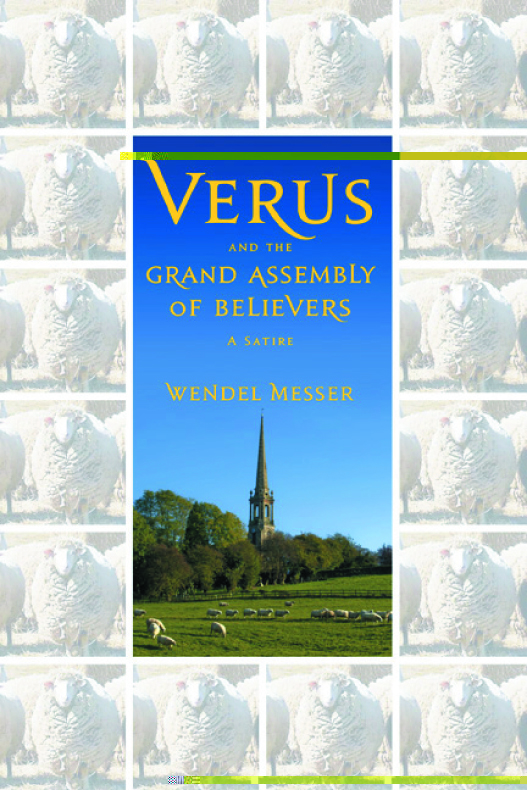VERUS
and the Grand Assembly of Believers
The scientists of the EU, to escape humankind’s most evil and persistent delusion, have a plan to upgrade the human race. The road to this brave new world connects in a fundamental way with the West’s Roman past.
It's the twenty- second century.
The world is dying. Belief is at
its last gasp.
The harried bishop
of Rome fights for survival.
The U.S. is a brutal
fundamentalist theocracy.

Review: A Stimulating Fantasy
“Verus, the main character, is a street beggar who speaks only Latin and
claims to be an ancient Roman...Although set in the future, the novel
features characters that seem realistically historic, including Pope
Innocent XIV and Gregory.
Gregory, a Catholic monk and a top official in the Vatican, is a closet
atheist. The dialogue between Verus, Gregory, Innocent, and others
propels the plot
forward.
While the story line is clearly a fantasy, this isn't so much a fantasy novel
as a fanciful, yet serious meditation ... The reader is prompted to
contemplate the structure of human values, human motivations,
and especially, human potential /.../
If this seems heavy going, it's not. The story is written in an uncluttered
style reminiscent of Ursula LeGuin, but with a sharper, more satirical edge.
For example, the voluptuous Bibi keeps the high-minded philosophical
discussions between the male characters grounded in base human instinct...
The characters are rich, vibrant, and contemporary, as well as historically
realistic. The moral debates are deep, yet accessible and
escapist. ”
Amazon customer review
Read full review
Résumé from the book's cover:
In the middle of the twenty-second century a street person hanging out at
Toronto’s Union Station, speaks only Latin. He calls himself “Verus”
(pronounced “Werus”). The only memory he has, is of ancient Rome.
The world’s last surviving Latin expert, Vatican Latinist and Minim friar
Gregory O'Riley, is called upon to solve the mystery surrounding Verus. The
monk Gregory is a renowned neuroscientist and is in charge of an EU mission
to escape the continuing failures of humanity.
Gregory’s transhumanist plan is to upgrade homo sapiens to homo
mirabilis, a superior being. Death will at last be conquered. Humankind
will break definitively with nature.
Because of his expertise in Latin, Gregory is much relied upon by Pope
Innocent XIV. Gregory is the Pontiff’s confidant and companion. But he is
hostile to religion. He taunts Innocent and tries to convert him to atheism.
Pope Innocent possesses great energy and ambition, but the numbers of the
faithful are dwindling under the pressure of rational imperatives and the
advance of knowledge, while in the world’s backward societies, superstition
and fanaticism run rampant. A wall separates Canada from the US, now a
backward fundamentalist theocracy.
Gregory is giving homo mirabilis a Roman program. Once the citizens of the
EU get the upgrade, they will necessarily speak Latin. Gregory intends to
build a transhumanist future by resurrecting the Roman Empire.
In this ultimate contest between faith and reason, the road to Gregory’s
brave new world connects in a mysterious but fundamental way with street
person Verus, and with the West’s Roman past.